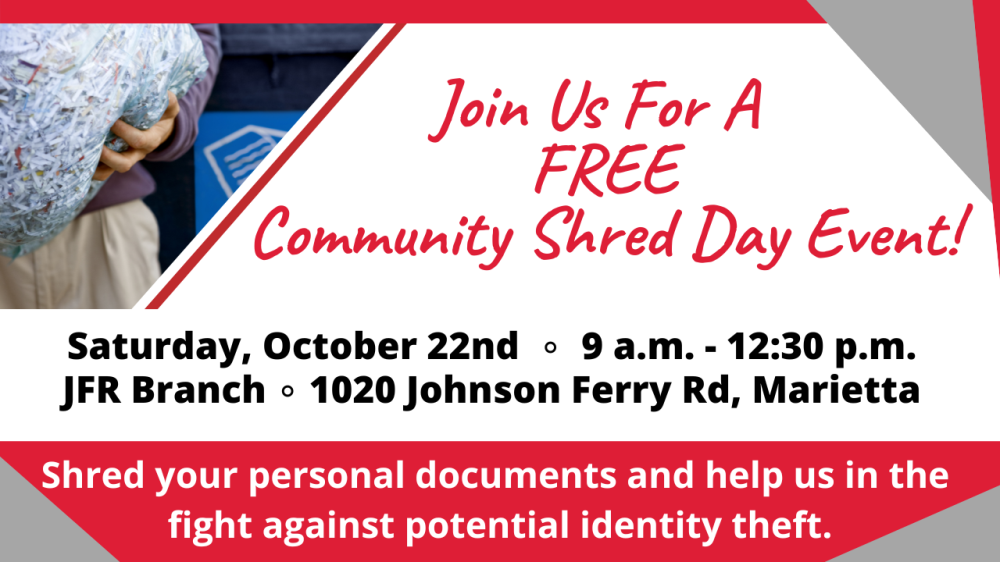|
CUGA CONNECT: September Membership Newsletter
|
|
|
|
|
|
|

MEMBER SPOTLIGHT What is our definition of Customer Service? ✨ Empowering members’ financial decisions ✨ Enhancing members’ financial lives ✨ Educating our members financially ✨ Exciting members’ financial experience Better Banking. Better Benefits. Better Believe It.
|
|

IN THE COMMUNITY Community Events? We are ALL about it! Not only do we sponsor, but we participate! Whether it is a 5K, Golf Tournament, or Concert in the Park - we will be there and we hope you stop by to say hi if you are there too! Follow us on Facebook, Twitter and Instagram to see your Credit Union out and about!
|
|
Save The Date Monday, September 5th Labor Day - All Locations Closed Wednesday, September 14th
Webinar: Financial Life Hacks
Register Here Wednesday, September 21st Webinar: Let’s Win the Credit Game to Achieve Our Dreams - Español Register Here Saturday, October 22nd | 9am - 12:30pm FREE Community Shred Day Event JFR Branch in East Cobb Friday, December 2nd | 2pm - 7pm CUGA Kids Club Santa Event Jiles Road Branch in Kennesaw
|
|
CD Rates Are On The Rise... Are you looking to get the best bang on your hard earned dollars? We understand and that is why we have increased our CD Rates across the board. With as little as $500 and terms ranging from 6 months to 60 months, you can chose the option best for your investment journey. Start earning more today!
|
|
|
|
|
Have You Checked Out Our New
CU Rewards + Interest Checking? We are excited to introduce a new lineup of Checking Accounts at including
CU Rewards + Interest & CU Rewards Checking*. These two new checking accounts include all of the amazing benefits below - plus so much more! - IDProtect® – Identity Theft monitoring and resolution service, that includes: Credit File, Report & Score Monitoring, Identity Monitoring, Dark Web Monitoring, Identity Theft Expense Reimbursement Coverage, Fully Managed Identity Theft Resolution Services, Online Identity Theft News Center & Valuable Phone and Web Resources
- Financial Wellness 360° – Access your financial wellness platform with unlimited one-on-one coaching, interactive courses, videos, booklets, infographics, and more to help maximize financial wellness.
- Up to $10,000 of 24-hour Accidental Death & Dismemberment Insurance
- Cell Phone Protection Coverage
- Debit Advantage® – Buyer’s Protection and Extended Warranty
- Rideshare Protection – Coverage while traveling in a vehicle operated by a Transportation Network Company.
- Roadside Assistance Service – 24-hour coverage for roadside assistance.
- VIP Concierge – Access to “911” travel emergency assistance service.
- Debit Card for Kids and Teens
- Health Discount Savings This is NOT insurance.
- $hopping RewardsTM
- Travel and Leisure Discounts
*Member must be enrolled in a CU Rewards + Interest Checking Account or a CU Rewards Checking Account to have access to the benefits listed above.
|
|
|
|

President/CEO'S MESSAGE It’s September - fall is approaching & FOOTBALL has started! 🏈 We’re stoked that you’re a member here at Credit Union of Georgia and we want to be sure that you know our team is on your side! From your home to the ball field, we're here for all of your banking needs. Visit us at CUofGA.org or stop by your local branch for all of our current promotions and offerings! Thank you for choosing Credit Union of Georgia & GO DAWGS! Brian Albrecht, President / CEO
|
|
|
|
|
|
EXCITING NEWS! You should have now received your new Visa Debit, Visa Business, or HSA Card in the mail! - Your new card will have a fresh new look.
- You will need to activate your new card once it arrives. Please use the phone number or web address provided on the sticker of the card to activate your new card immediately.
- Your card number is changing. Please update your card number on any payment platforms you currently have reoccurring payments set-up to ensure payments are not delayed.
- You will need to set a new personal identification number (PIN) for your new card. You can easily do this at 1-800-290-7893.
- Your current Visa Card will no longer work after Friday, September 30, 2022. Please activate your new card immediately upon receipt and shred your old card.
We apologize for any inconvenience this may cause you. If you have questions, please feel free to contact our Member Services Contact Center Monday - Friday from 7am - 7pm or Saturday from 9am - 1pm at 678-486-1111.
|
|
|
|
Protecting the Older People in Our Lives from
Becoming Victims of Scams In the last two decades the over-65 population of the world has greatly increased, and so has the average life expectancy. In the same period there have been dramatic advances in technology as well as a surge in the number of technological devices in most homes. A January 2022 Pew Research study found that 75% of adults over 65 in the United States are using the internet regularly. This increased use of technology brings a heightened risk of fraud for all Americans. In this article we will address the most prevalent scams that target our senior citizens and provide simple advice on how to protect yourself and your elderly loved ones. According to a recent report from the National Council on Aging (NCOA), Scams targeting older adults are on the rise. In 2021, there were 92,371 older victims of fraud resulting in $1.7 billion in losses. The five most common scams are summarized below, along with what to do to protect yourself and especially the seniors in your life. - Government Impersonation Scams
If you receive a call from someone claiming to be from a government agency, such as the Internal Revenue Service (IRS), the Social Security Administration, or Medicare be wary. Impersonators will attempt to convince you that they are acting on behalf of a legitimate agency. Never give out personal information on the phone or online when you received a call. Hang up and call back at a published number for the agency, not a number provided to you by the caller. The impersonator may try to use intimidation tactics to scare you, such as saying that you owe taxes, threatening to seize your assets or send you to jail if you do not act quickly. They may threaten to cut off your social security or medical benefits. Do not be fooled. They are trying to get you to respond in the moment. A legitimate agency will never use these tactics. Remember, when in doubt… CHECK IT OUT. A legitimate representative of a government agency will understand if you state that you are going to call back to verify that this information is correct and not fraud.
- Sweepstakes and Prize Scams
With the lure and excitement of winning something valuable, many victims willingly enter their bank account details to “validate their account” to receive the prize, only to find out later those funds have been removed from their account rather than added to it. Some scammers will invoke the name of well-known prize organizations, like Publishers Clearing House, to instill trust, then ask for a credit card number of personal information, all with the intent to commit identity theft. Vacation scams might indicate a deep discount on a property that either does not exist or is not owned by the person listing it. These offers will often stress the urgency of making a down payment immediately to lock in the discounted price. Once a victim falls prey to the scam, they may receive multiple requests for information or money from the fraudsters extending over months, or even years.
- Robo Call Scams
Robocalls takes advantage of phone technology to call thousands of phone numbers simultaneously hoping to find that one caller that will hold on to the line long enough for a scammer to then pick up the call. The robocall that everyone knows well is the expiring car warranty. These types of calls continue because they work based on the numbers of calls that are made across the country. If a person, in particular an elder American actually takes this call they may end up purchasing unwanted and unneeded items or worse. These robocalls are also used by criminals to phish for personal information using a variety of pretenses. One very simple and dangerous technique used by scammers is the “Can you hear me?” scam. In this scam the caller starts the conversation by saying “Can you hear me?” They record the older person saying “yes”. Whether it is a phony product or an intimidation scheme, claiming an “impending lawsuit” or fines from government agency or police, the scammer goes on to convince the elder person to provide a credit card number. If the senior later objects to the charges, the scammer can use the recorded “yes” to state that the elder “consented” to the charges.
- Computer Tech Support Scams
Whether it is a website pop-up, an email, or a phone call, Tech Support scams continue to be an effective way to dupe unsuspecting people into providing confidential information, credit card information and worse, remote control to their computer. Older citizens who may lack knowledge about computers and cybersecurity are particularly vulnerable to this scam, which goes like this. A pop-up message or blank screen appears on a computer or phone telling the victim their device is damaged and needs an urgent fix or data, especially precious photos, could be lost forever. When the victim calls the provided support number for help, the scammer will try to gather as much information as they can, which will help them commit other forms of fraud or identity theft. The cybercriminal may also request remote access to the older person’s computer, which may allow them access to credit card and bank account information. The fraudster may claim that there is a small fee for the service, not much so that it does not set off any alerts, but the real prize is the credit card number provided for the payment which can be used for additional fraudulent transactions later. According to the FBI’s 2021 Elder Fraud Reportthe Internet Crime Complaint Center (IC3) fielded 13,900 tech support fraud complaints from older victims who suffered nearly $238 million in losses.
- The Grandparent Scam
Many Americans over the age of 55 have grandchildren. As a person approaches age 70 and up, those grandchildren may be teenagers or young adults. This is a predictable audience for perpetrators of The Grandparent Scam. A caller may start the call with an urgent or upset tone, saying, “Hi, Grandpa, do you know who this is?” This question instantly lowers defenses as it implies that this must be someone you know. If an unaware grandparent says the name of a grandchild the scammer will confirm, instantly securing their trust. “Is this Billy?” “Yes, it is Billy, Grandpa. I am in trouble.” The scammer will go on to ask for money for urgent financial needs, such as a disabled vehicle, school loans, or jail bond. The criminal will ask that the grandparent to pay via gift cards or money transfer, so they can access the money and remain anonymous. In other versions of this scam the caller may pretend that they are an arresting officer or lawyer, even going as far as pretending to be a courier hired by the grandchild and going to the home of the elder to pick up cash or cards.
While these five scams count as the most prevalent, they are by no means the end of the line. How Can You Protect Your Loved Ones? - Keep your elderly family members and friends up to date about scams that are circulating online.
- Ensure that a trusted family member or financial advisor is keeping an eye on loved ones’ bank and retirement accounts, watching for suspicious withdrawals.
- Stay in touch! Regular visits and phone calls will keep you connected with your loved ones, lessening their chance of falling victim to a scam that targets those who feel isolated. In addition, your family member might mention a strange email, a new way to get their medicine, or a sweepstakes they have entered – all of these are red flags that you can follow up on.
- Share articles like this one with them and with others who help with caregiving needs. Staying current about what techniques scammers are using is the best form of protection.
Content Provided By NXG Strategies.
|
|
|
|
|
|












